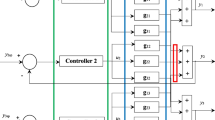Abstract
To improve the robustness of the traditional inverse system method, the internal model control based on a novel least square support vector machines (LS-SVM) is proposed. The novel LS-SVM considers general errors that include noises of input variables and output variables as empirical errors. The data of original MIMO discrete system is exploited to approximate its inverse model by the novel LS-SVM. By cascading the inverse model and the original system to constitute a decoupling pseudo-linear system, the internal model control strategy is carried out to the pseudo-linear system to realize the effective control. Simulation validates that the novel LS-SVM used in the inverse system identification is effective and shows that the internal model control of nonlinear discrete systems has better robustness of anti-interference and parameters varying than that of the open-loop system only based on inverse control.








Similar content being viewed by others
Explore related subjects
Discover the latest articles, news and stories from top researchers in related subjects.References
Lightbody G, Irwin GW (1997) Nonlinear control structures based on embedded neural system models. IEEE Trans Neural Netw 8(3):553–567
Rivals I, Personnaz L (2000) Nonlinear internal model control using neural networks: application to processes with delay and design issues. IEEE Trans Neural Netw 11(1):80–90
Li M, Zhou ZK, Shi LL (2004) The neural network decoupling control based on the internal model control. In: Proceedings of the 5th world congress on intelligent control and automation, Hangzhou, China, pp 2643–2646
Haber RE, Alique JR (2004) Nonlinear internal model control using neural networks: an application for machining processes. Neural Comput Appl 13:47–55
Chidrawar SK, Patre BM (2008) Implementation of neural network for internal model control and adaptive control. In: Proceedings of the international conference on computer and communication engineering, Kuala Lumpur, Malaysia, pp 741–746
Cui WT, Yan XF (2009) Adaptive weighted least square support vector machine regression integrated with outlier detection and its application in QSAR. Chemom Intell Lab Syst 98:130–135
Vapnik VN (1998) Statistical learning theory. Wiley, NewYork
Evgeniou T, Pontil M, Poggio T (2000) Regularization networks and support vector machiness. Adv Comput Math 13(1):1–50
Suykens JAK, Vandewalle J (1999) Least squares support vector machines classifiers. Neural Process Lett 9(3):293–300
Suykens, JAK, Lukas L, Vandewalle J (2000) Sparse approximation using least-squares support vector machines. In: Proceedings of the IEEE international symposium on circuits and systems, Geneva, Switzerland, pp 11757–11760
Markovsky I, VanHuffel S (2007) Overview of total least squares methods. Signal Process 87:2283–2302
Peng XJ, Wang YF (2009) A normal least squares support vector machine (NLS-SVM) and its learning algorithm. Neurocomputing 72:3734–3741
Dai XZ (2005) Inverse control method based on neural networks for multi-variables nonlinear system (in Chinese). Science Press, Beijing
Sun CY, Mu CX, Li XM (2009) A weighted LS-SVM approach for the identification of a class of nonlinear inverse systems. Sci China Ser F Inf Sci 52(5):770–779
Suykens JAK, Brabanter JD, Lukas L, Vandewalle J (2002) Weighted least squares support vector machiness: robustness and sparse approximation. Neurocomputing 48:85–105
Garcia CE, Morari M (1982) Internal model control: a unifying review and some new results. Ind Eng Chem Process Des 21(2):308–323
Acknowledgments
This work has been supported by the National Natural Science Foundation of China (No. 60874013 and No. 60953001).
Author information
Authors and Affiliations
Corresponding author
Rights and permissions
About this article
Cite this article
Mu, C., Sun, C. & Yu, X. Internal model control based on a novel least square support vector machines for MIMO nonlinear discrete systems. Neural Comput & Applic 20, 1159–1166 (2011). https://doi.org/10.1007/s00521-010-0468-3
Received:
Accepted:
Published:
Issue Date:
DOI: https://doi.org/10.1007/s00521-010-0468-3




